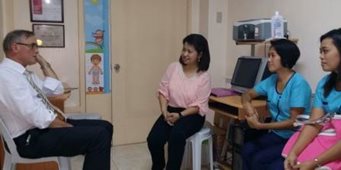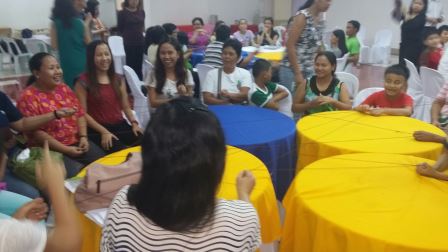WENDY POULSEN
Wendy Poulsen is Haemophilia Physiotherapist, Lady Cilento Children’s Hospital, Brisbane
The Queensland Haemophilia Centre is twinned with Brokenshire Hospital in Davao, the Philippines
The visit to the Philippines in July 2012 was a follow up from an initial visit done the previous year by Dr John Rowell from the Queensland Haemophilia Centre and Beryl Zeissink, the adult haemophilia nurse. They were able to establish initial contact with the appropriate health professionals in Davao, finding out how haemophilia was managed, how many patients were registered, and essentially the resources that were available. From this initial visit they were able to establish that there was a need for education on haemophilia to medical staff and training for nurses and physiotherapists, to be done over a two day period.
On the first day of our follow-up visit, Beryl and I were taken to the Brokenshire Hospital, where we had a tour of the hospital and then we ran a haemophilia clinic in conjunction with the local consultants. We take so many things for granted in Australia. There was a tiny little room, no air conditioning and to survive in the heat, the husband of one of the consultants “bought” the additional electricity required for a fan to be used in the room.
We had the pleasure of meeting 10 young men aged from 4 to 20 and their families in this morning clinic. These families appeared to have limited financial support, and they were unable to pay for product, or even essential things like crutches and splints.
The first little boy that I met had been seen by Dr John Rowell on the previous visit. He was concerned that this young man had perhaps developed an inhibitor because he had not responded to treatment that had been given. He had been given a couple of treatments with factor VIII, but he had a persistent knee bleed. At Dr Rowell’s suggestion to redo bloods, he was re-assessed and diagnosed with factor IX (9) deficiency. At the time of our visit, it had been confirmed that his factor deficiency was factor IX, and that his knee had made a full recovery.
I have been working in haemophilia for many years and can say that I have never met so many young men with debilitating joint and muscle conditions. It highlights the importance of a functioning multidisciplinary team, the use of factor for bleed management (and in the ideal world, even prophylaxis). I saw young men that had minimal joint movement and significant contractures, and I struggled to think how I could possibly help these young men, particularly with the minimal resources available. Suggestions of hydrotherapy, crutches, splinting, or a rehabilitation program just were not an option, as most of these families came from little villages located many miles from the treatment centre.
The next day we conducted an education seminar. This was attended by over 100 participants, including nurses, physiotherapists, an orthopaedic specialist, haematologists and physiotherapy students. The day’s program consisted of an education session in the morning and then break-out groups of nurses and physiotherapists and others. Topics covered were an overview of haemophilia, understanding von Willebrand disease (VWD), standards of nursing care in haemophilia and physiotherapy management in haemophilia.
The afternoon session was an interactive and animated session providing hands on assessment, practical demonstrations of casting and exercise programs. We were fortunate to be able to demonstrate on “real” patients, some who had recently had a bleeding episode, and some who had significant musculo-skeletal issues as a consequence of multiple poorly treated bleeds. It once again highlighted the limited resources available, including health professionals with a working knowledge of bleeding disorders, that we accept as routine.

We did our follow up visit in July 2014. I travelled with Dr John Rowell and Maureen Spilsbury, the Senior Social Worker. Once again our visit was challenged by the weather, with a cyclone brewing off the coast.
The focus of this visit was to continue our education of haemophilia, but additionally to focus on the genetics of haemophilia, pregnancy and delivery, through family group sessions directed by Maureen.
My direction this visit was to work with the physiotherapists in the use of the Haemophilia Joint Health Score (HJHS) and its practical application with patients. Over 20 physiotherapists and 5 physiatrists (rehabilitation physicians) attended my session where I provided education on treatment interventions; back to basic evaluation of muscle function, and HJHS. The afternoon session was attended by 15 patients (aged from 5-55 years old). Because of the age variance and thus complexities of physical presentations, the use/benefit of the HJHS was identified. In some cases the HJHS was not useful because of the physical limitations of the patients. It highlighted that good musculoskeletal assessments carried out by physiotherapists provided more useful information for both therapist and patient. I was delighted to see the depth of knowledge that these local therapists have.

The next day was directed by Maureen who ran several family group sessions focusing on genetics and psychosocial issues. This was well attended by over 100 people, including families, patients and health care professionals.
Once again we were looked after beyond our expectations. We were picked up and delivered, we were overfed, and made to feel so welcome. We all look forward to our continued contact in Davao.
We need to continue our support of this country. Improved conditions for people with bleeding disorders will only get better with the provision of dedicated factor, and through support for the dedicated health professionals with their passion to care for this group of people who have had such devastating consequences from their bleeding disorder. The continued development of an up-to-date registry of patients continues to challenge, but is necessary for the overall management.
Haemophilia Foundation Australia acknowledges the Traditional Owners and Custodians of Country throughout Australia, the land, waters and community where we walk, live, meet and work. We pay our respects to Elders past and present and extend that respect to all Aboriginal and Torres Strait Islander peoples.
Sign up for the latest news, events and our free National Haemophilia magazine